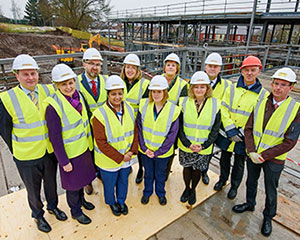A topping out ceremony has been held to celebrate the start of the roof being installed on the brand new purpose-built 24 bed community Intermediate Care Unit situated in the grounds at North Manchester General Hospital.
The build, which is running on time and to budget, was celebrated by representatives from local healthcare organisations who all gathered in the grounds of the unit, which once complete will help ease bed blocking and support elderly patients being discharged from hospital.
Prof Matt Makin, Executive Medical Director, and Damien Finn, Executive Director of Finance, at The Pennine Acute Hospitals NHS Trust were joined by Helen Speed, Director for Urgent Care at North Manchester Clinical Commissioning Group and Colin Carefoot Managing Director for the construction company, Carefoot Plc.
The unit is a joint partnership between The Pennine Acute Hospitals NHS Trust which runs North Manchester General Hospital, its NHS commissioner North Manchester Clinical Commissioning Group (CCG), and Manchester City Council. The cost of the new unit is expected to be around five million pounds and the build will be complete by the end of the year.
The new unit will become part of the Trust’s Community Assessment and Support Service (CASS), a new integrated service delivery model that aims to avoid admissions, reduce length of stay and improve patient and carer experiences by providing better access to the right intervention, at the right time, delivered by the right health or social care worker.
The unit will be low-rise in design and have a welcoming homely feel for patients with a sunken communal garden and a mock apartment to help patients adjust to home life again. It is being built on an old overflow car park to the North of the hospital site.
Since November 2014 the Pennine Acute Trust has been providing nine temporary intermediate care beds at North Manchester General Hospital on ward J5 in the main hospital building. These are in addition to 15 beds currently at Henesy House, a residential home in Collyhurst, Manchester. This new Intermediate Care Unit will replace all of these beds.
The majority of patients who access intermediate care services are over 75 years of age and the new unit will provide an enhanced service for community patients who require a period of rehabilitation. The new unit will also support patients who do not require, or no longer need, specialist acute hospital care and treatment, but who do still need support within a community setting. The unit will offer patients support in the transition period between illness and recovery.
Intermediate care is a service that is designed to rehabilitate people with input from a team of dedicated professionals. That team could include any combination of nurses, physiotherapists, occupational therapists, GPs, assistant practitioners, health care assistants, pharmacists, speech and language services, podiatrists and social care workers.
Professor Matt Makin, Medical Director at The Pennine Acute trust, said:
“The future of North Manchester General Hospital (NMGH) is secure. It has a vitally important role to play in providing a range of local hospital services to a population with complex health needs. We are working with our commissioners and our healthcare partners across Greater Manchester on developing NMGH as a local hospital site that provides “Best in Class” services for patients with complex multi-morbid conditions. North Manchester General will be supported through the improvement work that is happening across Pennine Acute in partnership with Salford Royal and will benefit from new site leadership arrangements, which are now in place, and investment such as this to benefit patients and their families. This is an excellent example of joint working, vision and investment across local health and social care organisations.”
Councillor Paul Andrews, Executive Member for Adult Health and Wellbeing for Manchester City Council, said:
“We need to move to a position where the system looks at all aspects of a person’s health – including how they will manage once they are getting ready to leave hospital. Joining medical, community and social support is not only a strong holistic move, but it is preventative too so that people have chance to fully recover.”







